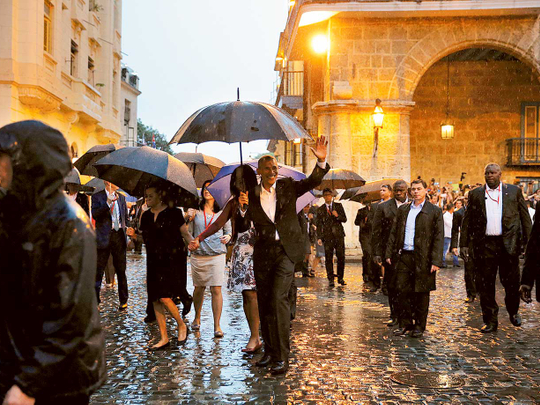
The other day when US President Barack Obama landed in the rain at a Cuban airport on a historic visit to the country, we saw him holding an umbrella himself. Behind him was the first lady Michelle, who was also holding aloft this rain cover.
Obama did the routine handshaking, all the while holding the umbrella with his other hand. “Wow” I exclaimed, watching the world’s most powerful person moving in a manner like any ordinary person. There was nobody holding umbrellas for the dignitaries as we do in India. The informality and casualness in Obama’s conduct was simply heart-warming.
As we know, the US president is accorded the highest form of security. And Obama was no exception. In fact, more than adequate precautions must have been taken because the president was visiting a country with which the US had hostile relations for several decades.
Seeing Obama and the first lady holding umbrellas, I exclaimed, “Incredible, unthinkable” because such a phenomenon is alien to the political class in India.
Many of yesterday’s underprivileged in India have become today’s privileged. They included some of the very classes that had suffered during British rule and due to the caste system.
Going back to the theme of this write-up, I may add that we often see some foreign dignitary on a visit to India disembarking from the aircraft with his overcoat or raincoat slung on his arm and a briefcase in the other hand.
Such a thing is unthinkable about politicians and even bureaucrats in India. Some time ago, British Prime Minister David Cameron was seen travelling in a metro in London. He was standing, resting against one of the windows. Apparently, no seat was available to him and perhaps there was no special cabin or space earmarked for a dignitary like him.
Not that kind of person
Cameron was not the kind of person who would expect his staff to make a passenger vacate a seat for him, as happens in our own parliamentary democracy, which is a prodigy of that very system of government.
In our set-up, there have been times when passengers with confirmed tickets for a flight or railway coach had been forced out to accommodate a member of parliament or state legislature out of turn, simply because he falls under the category of what is known in India as a VIP.
Flights or trains being held up beyond their departure time because some MP or MLA had not arrived on time is a common experience of travellers. Aeroplane travellers who refused to allow a late VIP in Pakistan to board the flight made headlines some time ago. Often, trains are stopped at unscheduled stations for the convenience of someone from the political class.
For some decades now, there has been a growing craze among politicians in Uttar Pradesh, neighbouring Bihar and some other places to demand one or more ‘gunmen’ to accompany them all the time due to a perceived threat to their lives. And they actually get these police bodyguards. In some cases the threat is real because of their criminal background, but in many cases they want uniformed guards to serve as status symbols.
Once, while travelling on a train, I noticed a policeman with a rifle slung over his shoulder escorting a small-time politician to his seat in a row in front of mine. The ‘gunner’, as they are called in the political circles, placed the politician’s briefcase on the luggage rack and went back to the corridor near the door.
After some time, he came back and gave the politician his mobile phone to attend to a call. After finishing his talk, he gave it back to the policeman, evidently because the politician did not want to carry even the small gadget himself. At the station, when the leader alighted I saw that hardly a handful of people had come to receive him. However, the policeman, carrying the rifle, the briefcase and the leader’s mobile phone, faithfully did his duty by “dispersing” the “crowd” of maye five or six and clearing the passage for his boss.
This was our pattern of democracy in action.
— Lalit Raizada is a journalist based in India.









